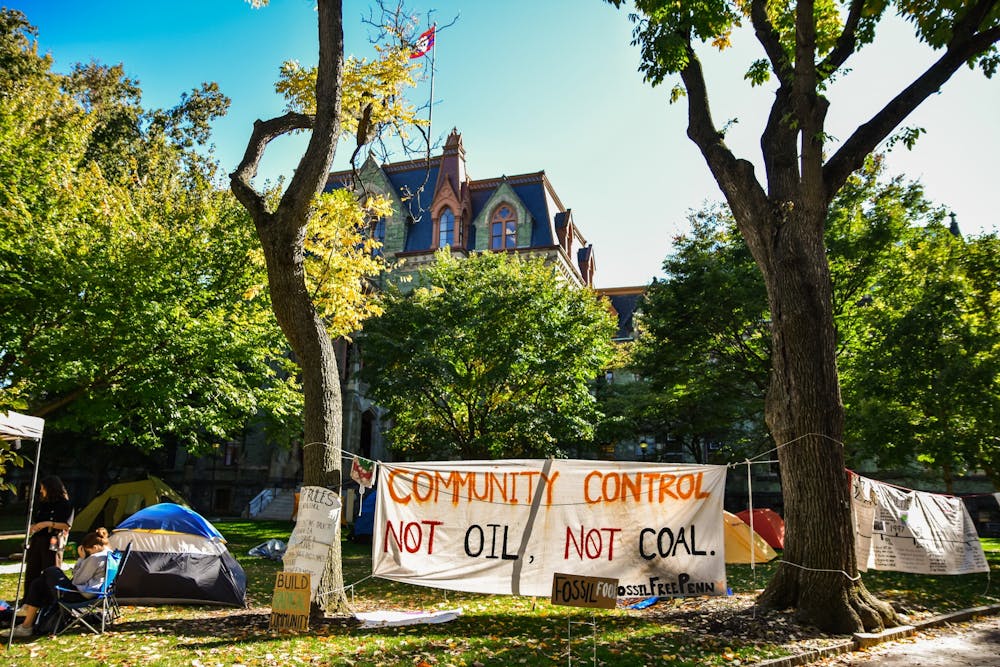
Penn clarified that it no longer holds any direct investments in fossil fuel companies, going further than previous announcements about its fossil fuel holdings.
In a written statement published Tuesday, Penn President Liz Magill and Board of Trustees Chair Scott Bok wrote that the University does not hold investments in 200 companies whose reserves contain the largest amount of potential carbon emissions. The administrators acknowledged the current arguments being made against fossil fuels in university endowments.
However, Magill and Bok wrote that policy decisions are made "complex" by the significant role that fossil fuels still play in the global economy.
"We must move away from fossil fuels, but we can only do so completely once we can produce abundant, affordable, and secure energy from carbon-free sources," Magill and Bok wrote. "Even as we are moving down the path towards our collective goal, society will still have to consume fossil fuels."
In response to a request for comment, Penn spokesperson Ron Ozio wrote that there was no information he wanted to add to the statement.
The message appears to address parts of the demand raised in a renewed campaign by Fossil Free Penn this semester that Penn divest from fossil fuels. Most recently, FFP stormed Penn’s Homecoming football field on Oct. 22 during the game’s halftime, leading to 19 arrests.
The disruption was the last event in the group’s 39-day encampment on College Green, which sought to bring attention to the group's three demands – which included total fossil fuel divestment. This demand had three components: that the University end new investments in the fossil fuel industry, remove direct and commingled holdings in the top 200 fossil fuel companies within five years, and reinvest a portion of the extricated funds into clean energy assets.
In a written statement to The Daily Pennsylvanian, FFP coordinators College junior Jae Hargest and College sophomore Eug Xu said that Penn's claim that having net-zero carbon emissions in its endowment and ending direct, but not indirect, fossil fuel investments constitutes divestment "is false."
"While both of these policies sound nice on paper, they fail to encapsulate the majority of Penn’s investments in fossil fuels," Hargest and Xu wrote.
They went on to reiterate their belief that Penn should divest from indirect holdings as well in order for the University to stop "'punishing the world's most economically vulnerable,' as they state themselves."
"[The University's] power comes from Penn’s status as a prestigious institution, one which boasts the world's best business school, and making a political statement is its most powerful way to signal and encourage change," Hargest and Xu wrote.
The University estimates that around $250 million of its endowment is allocated toward investments related to the clean energy transition, Magill and Bok wrote. They wrote that the University's thinking regarding investment decisions is subject to "ongoing review."
Members of the Student Sustainability Association at Penn, with the assistance of faculty and professionals, have previously estimated that about 1% of the University's endowment is invested in fossil fuels. This would translate to about $207 million out of the $20.7 billion endowment, though Chief Investments Officer Peter Ammon previously said that the exact environmental footprint of Penn’s endowment is difficult to calculate.
"Penn’s endowment, if stewarded responsibly, can provide perpetual support for those core and essential University missions," the administrators continued. "Our endowment’s net-zero goal, our desire to support real world decarbonization, and our hundreds of millions of dollars of investments in the energy transition are all elements of that stewardship."
Prior to Tuesday's message, Penn announced in November 2021 that it would halt commitments to private equity vehicles dedicated to investments in fossil fuel production — at the time, this was an update to its existing practice of not making new direct investments in companies engaged in the production of fossil fuels.
According to a newly updated webpage about Penn's sustainability efforts, the University has reduced overall carbon emissions by 45% as of the end of fiscal year 2022, a step toward its goal of reaching net-zero carbon emissions by 2050.
After Princeton voted to dissociate from 90 fossil fuel companies and divest from all publicly traded fossil fuel companies, Penn and Yale became the only two Ivy League institutions that have yet to divest.
"Indirect investments – what Penn is not divesting from – took up 99.97% of Princeton’s investments in fossil fuels at the time of their divestment," Hargest and Xu wrote. "We have good reason to believe that Penn’s endowment is not substantially different."
In a previous statement to the DP, Senior Executive Vice President Craig Carnaroli wrote that the University has “reviewed peer statements” and found that Penn's policies are “quite consistent.”
The Daily Pennsylvanian is an independent, student-run newspaper. Please consider making a donation to support the coverage that shapes the University. Your generosity ensures a future of strong journalism at Penn.
Donate







